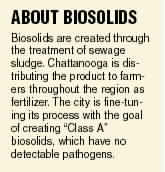Clean Water Advocacy - Newsroom - NACWA in the News
From waste to watermelons
Farmers say treated sewage works as well as commercial fertilizer
By Ian Berry Staff Writer
One person’s sewage sludge is another’s "biosolid."
Chattanooga is taking the material left over from the treatment of wastewater
and increasing efforts to spread it on farms as fertilizer.
Farmers using the material say it works as well as commercial fertilizer and
saves them thousands of dollars. City officials say the process is an
environmentally friendly way to recycle the material rather than dumping it in
landfills.
However, some environmentalists and scientists aren’t yet convinced the material
is safe. Ellen Z. Harrison, director of the department of Crop and Soil Sciences
at Cornell University, said questions remain about pathogens and metals that
become more concentrated in the material after treatment.
"There is no such thing as safe," Ms. Harrison said. "There is only risk, and
people deem that to be acceptable or not acceptable."
Advocates of biosolids acknowledge there’s a "yuck" factor involved in the idea
of converting domestic wastes into crop fertilizer. But Jerry Stewart, director
of the city’s waste resources division, handles the material with his bare hands
to demonstrate its texture.
"It’s not the stuff they flush down the john," Mr. Stewart said. "It’s not that.
It’s processed."
Chattanooga pays Recyc LLC, based in Boaz, Ala., $15 per ton to find farmers and
haul the material to them, Mr. Stewart said. That’s $5 less per ton than the
city was paying to have the material hauled to landfills, most recently the Rhea
County landfill, he said. With the city producing about 100,000 tons of the
material per year, that amounts to $500,000 in savings, Mr.
Stewart said.
Mr. Stewart said farmers in Sequatchie and Marion counties in Tennessee and in
Jackson and Marshall counties in Alabama have used the material. He said the
city plans to expand its usage to other counties, including Hamilton, but that
sending it farther than about 50 miles from Chattanooga isn’t economically
feasible.
Both supporters and skeptics of biosolids say the term was coined about 15 years
ago by industry and municipal officials trying to create a more positive image
and distinguish it from sewage sludge.
"My problem with that phrase is that it’s totally ambiguous," Ms. Harrison said.
"A corn stalk is a biosolid."
Sam Hadeed, spokesman for the National Biosolids Partnership, acknowledges the
material can be unsightly and smelly, but he said it’s safer than manure because
it’s regulated.
"When people think it’s a euphemism, they have a right to that opinion, but it’s
not the same product," Mr. Hadeed said. In Sequatchie County, some farmers who
use biosolids for farming say it works as well as commercial fertilizer. Jan
Johnson, who farms cattle on land overlooking the Sequatchie River, said he sees
biosolids, which save him $50 per acre over commercial fertilizers, as a win-win
for farmers and the city.
He said he tries to run his farm in an environmentally sensitive way, ensuring
the cows don’t get into the river and not applying biosolids within 150 feet of
the road or river. He said he stays informed on the topic and looks for any
evidence that metals could be a problem.
"I’ve still got some concerns about that, but the benefits outweigh the
concerns," Mr. Johnson said.
Cornell University’s Waste Management Institute has issued reports warning of
concerns that metals harmful to humans, such as lead, cadmium and mercury, can
end up in biosolids if they are discharged from homes or industries. The metals
remain in the soil for a long time, reports from Cornell indicate.
The city has two sets of equipment for producing biosolids at its Moccasin Bend
Wastewater Treatment Plant, officials said.
One of the systems is using six new filter presses, machines that increase
pressure on the sewage sludge, allowing it to boil at temperatures barely above
100 degrees. This removes water from the sludge.
The city is still working out the kinks in this process to create biosolids
rated "Class A," meaning they have no detectable pathogens.
The city’s other system for creating biosolids involves using centrifuges to
remove water from the sludge. The end product has a higher water content than
the biosolids from the filter presses and is rated "Class B," meaning it is not
completely free of pathogens.
E-mail Ian Berry at
iberry@timesfreepress.com

Staff Photo by Lido Vizzutti Allan Sharpe inspects corn on the farm he operates in Sequatchie County, Tenn. Mr. Sharpe fertilizes the farm with biosolids from Chattanooga Public Works.




